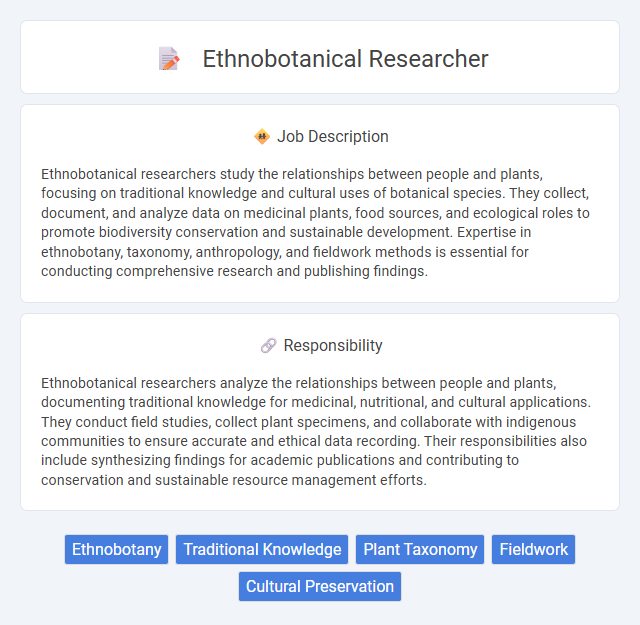
Ethnobotanical researchers study the relationships between people and plants, focusing on traditional knowledge and cultural uses of botanical species. They collect, document, and analyze data on medicinal plants, food sources, and ecological roles to promote biodiversity conservation and sustainable development. Expertise in ethnobotany, taxonomy, anthropology, and fieldwork methods is essential for conducting comprehensive research and publishing findings.
Individuals with a strong interest in cultural heritage and plant-based knowledge are likely to be well-suited for an ethnobotanical researcher role, as it involves studying the relationship between people and plants in various communities. Those who possess patience, attention to detail, and adaptability to diverse field conditions will probably thrive in this job due to frequent fieldwork and data collection in remote or challenging environments. People who prefer structured office work and minimal travel may find this career less compatible with their preferences.
Qualification
Ethnobotanical researchers typically hold advanced degrees in ethnobotany, anthropology, botany, or related fields, with a strong foundation in both biological sciences and cultural studies. Expertise in field research methods, data analysis, and knowledge of indigenous plant uses are essential qualifications. Proficiency in scientific writing and familiarity with local languages or dialects enhances the effectiveness of ethnobotanical investigations.
Responsibility
Ethnobotanical researchers analyze the relationships between people and plants, documenting traditional knowledge for medicinal, nutritional, and cultural applications. They conduct field studies, collect plant specimens, and collaborate with indigenous communities to ensure accurate and ethical data recording. Their responsibilities also include synthesizing findings for academic publications and contributing to conservation and sustainable resource management efforts.
Benefit
Ethnobotanical researchers likely uncover valuable insights into the relationships between indigenous cultures and native plants, which might contribute to advancements in medicine, agriculture, and conservation. Their work probably aids in preserving traditional knowledge and biodiversity, offering potential solutions to environmental and health challenges. This role may provide opportunities to influence sustainable practices and promote cultural heritage preservation.
Challenge
Ethnobotanical researchers likely face challenges related to accurately documenting traditional knowledge while respecting cultural sensitivities and intellectual property rights. They may encounter difficulties in accessing remote communities and establishing trust to gather reliable data. Navigating ethical considerations and ensuring sustainable use of plant resources could also present ongoing complexities in their work.
Career Advancement
Ethnobotanical researchers analyze traditional knowledge and plant use to advance fields like pharmacology, agriculture, and conservation. Career progression often includes roles such as senior researcher, project manager, or academic professor, where expertise guides innovative studies and policy development. Mastery in interdisciplinary methods and publication in peer-reviewed journals significantly enhance job prospects and leadership opportunities.
Key Terms
Ethnobotany
Ethnobotanical researchers study the relationships between people and plants, focusing on how indigenous cultures use flora for medicine, food, and rituals. They conduct fieldwork to document traditional knowledge, analyze plant properties, and contribute to biodiversity conservation and sustainable resource management. Their work supports ethnopharmacology, cultural preservation, and the development of novel natural products.
Traditional Knowledge
Ethnobotanical researchers specialize in documenting and analyzing traditional knowledge related to the use of plants by indigenous and local communities. Their work involves preserving cultural heritage by studying medicinal, nutritional, and ritualistic applications of flora passed down through generations. This research aids in biodiversity conservation and the discovery of novel pharmaceuticals rooted in ancestral wisdom.
Plant Taxonomy
Ethnobotanical researchers specializing in plant taxonomy identify, classify, and document plant species used in traditional cultures, enhancing understanding of botanical diversity and cultural heritage. They employ field studies and molecular techniques to analyze plant characteristics and genetic relationships, supporting conservation and sustainable use. Their work contributes critical data for pharmacological research and biodiversity management.
Fieldwork
Ethnobotanical researchers conduct extensive fieldwork to document traditional knowledge of plant uses among indigenous and local communities, often navigating remote and challenging environments. They collect plant specimens, record cultural practices, and engage in interviews to understand the relationship between people and plants, ensuring accurate data for conservation and sustainable use. Fieldwork is critical for generating primary data that supports pharmacological studies, biodiversity preservation, and the protection of intangible cultural heritage.
Cultural Preservation
Ethnobotanical researchers play a vital role in cultural preservation by documenting and analyzing traditional knowledge about plants used by indigenous and local communities for medicinal, nutritional, and ritual purposes. This research safeguards ancient practices from being lost while promoting sustainable use of biodiversity and fostering respect for cultural heritage. Their work supports conservation efforts and aids in the development of community-driven policies that protect both cultural identities and natural resources.
 kuljobs.com
kuljobs.com